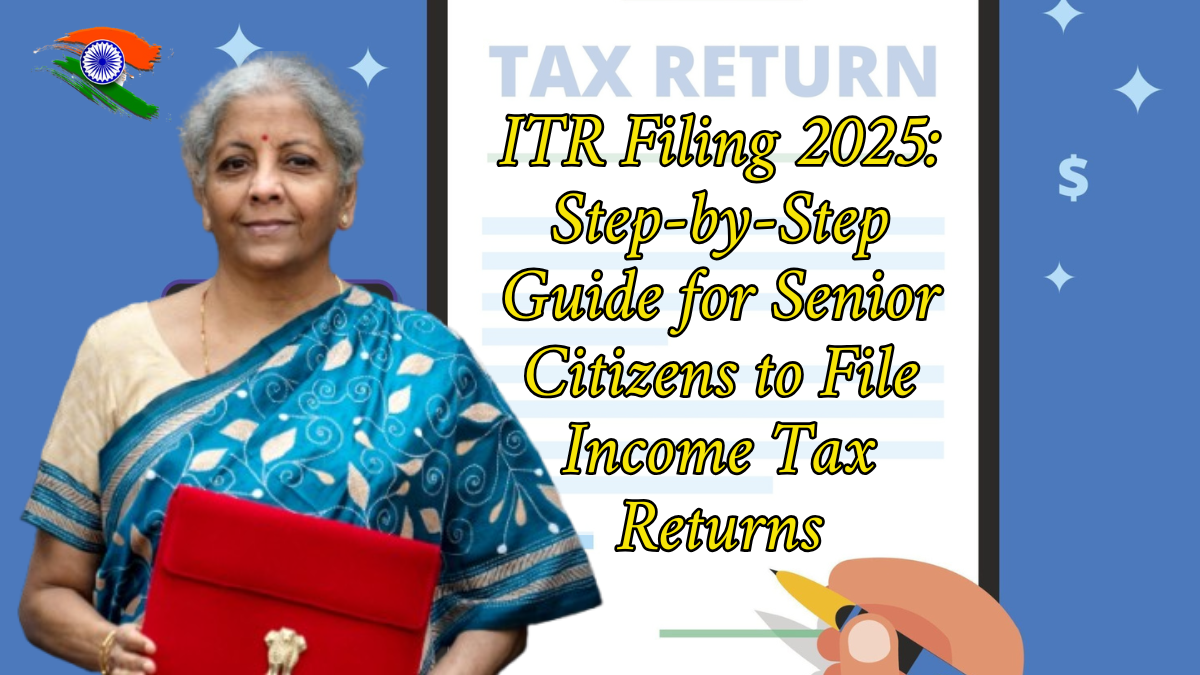Comprehensive Guide to ITR Filing for Senior Citizens in FY 2024-25 (AY 2025-26) (New Income Tax Slab and Rates – FY 2025-26 (AY 2026-27))
Filing income tax returns (ITR) can be a complex process, especially for senior citizens. However, the Indian Income Tax Department offers several benefits and exemptions to ease this burden. This guide provides a detailed overview of the ITR filing process for senior citizens, including eligibility criteria, applicable forms, tax slabs, and exemptions.

Table of Contents
Summary Table: Key Details for Senior Citizens’ ITR Filing
Aspect |
Details |
|---|---|
Applicable Assessment Year |
AY 2025-26 |
Financial Year |
FY 2024-25 |
Basic Exemption Limit |
₹3,00,000 (Senior Citizens 60-79 years) |
Basic Exemption Limit |
₹5,00,000 (Super Senior Citizens 80+ years) |
Standard Deduction |
₹50,000 (Old Regime), ₹75,000 (New Regime) |
Interest Income Deduction (Section 80TTB) |
Up to ₹50,000 |
Medical Insurance Deduction (Section 80D) |
Up to ₹50,000 |
Specified Diseases Deduction (Section 80DDB) |
Up to ₹1,00,000 |
Exemption from ITR Filing |
Available under Section 194P for residents aged 75+ with only pension and interest income from the same bank |
Required Declaration Form |
Form 12BBA |
Official Income Tax Portal |
Understanding Senior and Super Senior Citizens
- Senior Citizens: Individuals aged 60 years or above but less than 80 years during the financial year.
- Super Senior Citizens: Individuals aged 80 years or above during the financial year.
Income Tax Slabs for Senior Citizens
Old Tax Regime
For Senior Citizens (60-79 years):
Income Range (₹) |
Tax Rate |
|---|---|
Up to 3,00,000 |
Nil |
3,00,001 – 5,00,000 |
5% |
5,00,001 – 10,00,000 |
20% |
Above 10,00,000 |
30% |
For Super Senior Citizens (80+ years):
Income Range (₹) |
Tax Rate |
|---|---|
Up to 5,00,000 |
Nil |
5,00,001 – 10,00,000 |
20% |
Above 10,00,000 |
30% |
New Tax Regime
Under the new regime, the basic exemption limit is ₹2,50,000 for all individuals, regardless of age. However, the tax rates are lower, and certain deductions and exemptions are not available. (New Income Tax Slab and Rates – FY 2025-26 (AY 2026-27))
Key Tax Benefits for Senior Citizens
- Higher Exemption Limits: As detailed above, senior and super senior citizens enjoy higher basic exemption limits compared to other taxpayers. (Income Tax Slab for Senior Citizens FY 2025-26 – Bankbazaar)
- Standard Deduction:
- ₹50,000 under the old tax regime.
- ₹75,000 under the new tax regime. (Income Tax Slab For Senior Citizen and Super Senior Citizen FY …)
- Interest Income Deduction (Section 80TTB): Deduction of up to ₹50,000 on interest income from banks, post offices, or cooperative banks. (Income Tax Slab For Senior Citizen and Super Senior Citizen FY …)
- Medical Insurance Premium (Section 80D): Deduction of up to ₹50,000 for premiums paid towards health insurance. (Tax benefits for senior citizens: How can you maximize savings in …)
- Specified Diseases Treatment (Section 80DDB): Deduction of up to ₹1,00,000 for expenses incurred on treatment of specified diseases for self or dependents. (Income Tax Slab For Senior Citizen and Super Senior Citizen FY …)
- Exemption from Advance Tax: Senior citizens not having income from business or profession are exempt from paying advance tax.
Exemption from ITR Filing under Section 194P
Introduced in the Finance Act, 2021, Section 194P provides relief to senior citizens aged 75 years or above by exempting them from filing ITR, subject to certain conditions: (Section 194P – Exemption For ITR Filing For Senior Citizens)
- Eligibility Criteria:
- Resident senior citizens aged 75 years or above.
- Having only pension income and interest income from the same bank.
- The bank is a ‘specified bank’ notified by the government. (Section 194P – Exemption For ITR Filing For Senior Citizens, Senior Citizens and Super Senior Citizens for AY 2025-2026)
- Procedure:
- Submit Form 12BBA to the specified bank, declaring total income and deductions.
- The bank will compute taxable income, deduct applicable TDS, and file the necessary reports.
- Once this process is completed, the senior citizen is not required to file an ITR. (Section 194P – Exemption For ITR Filing For Senior Citizens)
Selecting the Appropriate ITR Form
Choosing the correct ITR form is crucial for accurate filing.
- ITR-1 (Sahaj):
- Applicable for individuals with income up to ₹50 lakh from salary, pension, one house property, and other sources (excluding lottery and racehorses).
- Not applicable if the individual is a director in a company or has invested in unlisted equity shares.
- ITR-2:
- For individuals and HUFs not having income from business or profession.
- Suitable for those with capital gains, more than one house property, or foreign income.
- ITR-3:
- For individuals and HUFs having income from business or profession.
- ITR-4 (Sugam):
- For individuals, HUFs, and firms (other than LLP) having total income up to ₹50 lakh and income from business or profession computed under sections 44AD, 44ADA, or 44AE.
Step-by-Step Guide to Filing ITR for Senior Citizens
- Gather Necessary Documents:
- PAN card, Aadhaar card, bank statements, Form 16/16A, pension statements, investment proofs, and details of deductions.
- Choose the Correct ITR Form: Based on your income sources and eligibility, select the appropriate ITR form.
- Access the Income Tax Portal:
- Visit incometax.gov.in.
- Register or log in to your account. (Senior Citizens and Super Senior Citizens for AY 2025-2026)
- Fill in the ITR Form:
- Enter personal details, income details, deductions, and tax payments.
- Use the pre-filled data available on the portal to ease the process.
- Verify Tax Calculations: Ensure that the tax liability computed is accurate, considering all deductions and exemptions.
- Submit the ITR: After reviewing all details, submit the ITR form electronically.
- E-Verification:
- Verify the ITR using Aadhaar OTP, net banking, or by sending a signed physical copy to CPC, Bengaluru.
Frequently Asked Questions (FAQs)
Q1. Are senior citizens required to pay advance tax?
A1. No, senior citizens not having income from business or profession are exempt from paying advance tax.
Q2. Can senior citizens claim deductions under Section 80C?
A2. Yes, senior citizens can claim deductions up to ₹1.5 lakh under Section 80C for investments in specified instruments.
Q3. Is Form 15H applicable for senior citizens?
A3. Yes, senior citizens can submit Form 15H to banks to avoid TDS on interest income if their total income is below the taxable limit. (Section 194P – Exemption For ITR Filing For Senior Citizens)
Q4. What is the deadline for filing ITR for AY 2025-26?
A4. The due date for filing ITR for AY 2025-26 is typically July 31, 2025, unless extended by the government.
Q5. Can senior citizens opt for the new tax regime?
A5. Yes, senior citizens can choose between the old and new tax regimes based on which is more beneficial for them.
For more detailed information and assistance, visit the official Income Tax Department website: incometax.gov.in. (Senior Citizens and Super Senior Citizens for AY 2025-2026)
For More Information Click Here



